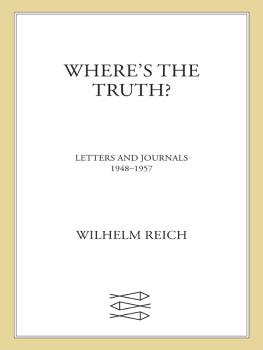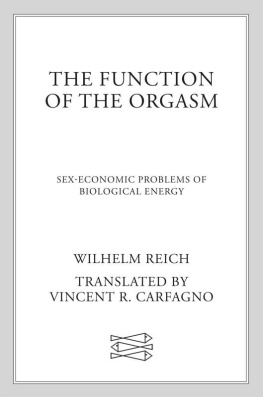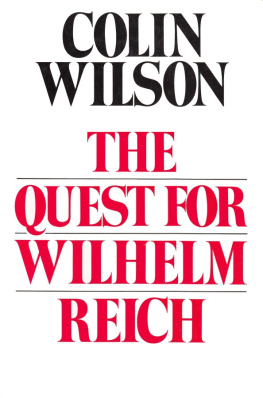W ilhelm Reich (1897-1957), the brilliant psychoanalytic theorist and protg of Sigmund Freud, is one of the most restless figures in modern thought. His outer journeys led him from his native Austria to Germany, to Denmark, to Sweden, to Norway, and finally to the United States (partly because he had to flee the Nazi government after Germanys annexation of Austria in 1938, which automatically made him an inhabitant of the Third Reich). He was persecuted by the psychoanalytic establishment, by the Communist Party, and by the Danish, Swedish, Norwegian, and U.S. governments, and died in a U.S. federal prison, where he was being held on trumped-up charges made against him by the Food and Drug Administration. His life had genuine tragic components, many clearly self-caused, but not all. He had a turbulent personal life with three marriages and many love affairs. Unlike his one-time mentor and father figure, Freud, he remained fully sexually active until his imprisonment and felt he could not endure to live without fairly regular sexual connection.
Reich is rarely written about these days, let alone read by serious students of psychology or historians of ideas. The standard view is that he had some promising ideas about character formation, emotional armoring, the latent negative transference, stasis anxiety, orgastic potency, the formation of the fascist personality, and defense mechanisms, but that by the mid- or late 1930s he had succumbed to a latent psychosis (probably paranoid schizophrenia) and strayed from psychoanalysis into pseudoscientific terrain with his explorations into so-called bions, the cancer biopathy, and cosmic orgone energy.
This standard view is based on a profound misreading both of Reichs texts and of his own life story. Moreover, work coming out of his research has not been properly attended to by outsiders (one glaring example being the neglect of his 1933 book Character Analysis , revised and expanded in 1945 and then again in 1948, but not published until 1949), who would have had to pay serious attention to the detailed experimental procedures undertaken by Reich, especially in his last years, in order to understand it fully. Typically, Reich is demonized (often by people who have never read him) or his work is split apart and the so-called good Reich is contrasted to the insane Reich. Consequently, the situation is not one that has lent itself to a focused examination of his categorial scheme or of his own complex psyche.
My own view is that there is much wisdom to be found in almost all of Reichs writings, including his sometimes ridiculed philosophical texts of the early 1950s. I also take very strong issue with the common claim that Reich suffered from paranoid schizophrenia. No paranoid schizophrenic could have written the brilliant and conceptually consistent books that Reich did year after year after year, whatever their ultimate empirical merits or failings. In fact, very few writers in any field, whether healthy or diseased, show such amazing lucidity in their texts over a lifetime of writing.
I do think that Reich manifested forms of hypomania with an attendant psychic inflation, but it is not at all clear that he suffered from, say, manic-depressive disorder. If one listens to his recently reproduced clinical lectures from 1949, entitled Orgone Therapy (available in a six-disc CD format from the Wilhelm Reich Museum in Maine), one hears no indication of the pressure of speech or of any kind of manic ideation. In fact, his interaction with his peers and interlocutors in these lectures shows him to be fully in command of his ideas while being engagingly open to critique. Was he paranoid during his final years in America? Probably, but new evidence has begun to reveal just how extensive was the harassment of him and his work, and it suggests that external events exacerbated his paranoid traits.
It is my conviction that Reich provided an extremely important component for what a sexually liberated life-philosophy would look like. I will also argue that in such works as his Ether, God and Devil , and Cosmic Superimposition , written mostly in English in the early 1950s, Reich was creating his own version of an ecstatic naturalist and universalistic religion. Although he would have been profoundly uncomfortable with such language, as he often was intensely critical of what he called religious mysticism, for example, as it manifested itself in the Nazi movement, my sense is that he sought a deeper religiosity that came from the core of the self (the primary drives) rather than from neurotic or even psychotic forms of religion that ultimately came from the violent and sexually suppressed secondary drives.
Reich had a kind of hypomanic intensity in his dealings with the world, leading his student and biographer Myron Sharaf to give his conceptually weak and negative biography on Reich the title Fury on Earth. His astonishing energy was manifest in both positive and negative ways. On the positive side, it was manifest in his unrelenting quest to get at the heart of things, to probe into the ultimate structures of psyche, soma, and cosmos. On the negative side, it was manifest in his direct and nonevasive tactics with patients and with analysts in training (as he tried to pry loose the latent negative transference) and with his unrelenting focus on the validity of his own ideas. (Of course, the astonishing hostility facing his work only deepened this focus, catching him in a vicious cycle.)
Given the astonishing distortions that have been imposed upon his work, it is once again time to do a very careful textual reading of his pertinent major and minor writings so as to rescue them both from the encrustations of history and from the willful distortions of the psychoanalytic establishment. It will be impossible in this limited study to examine all of his writings, but we can get a very clear picture of his conceptual system from the texts that we do examine, and I will be mindful of his whole corpus as I unfold his categorial framework. I will also slightly stress the earlier psychoanalytic material, as I feel that some of it has been neglected, especially the works of the 1920s, the brilliant political and psychoanalytic material of the 1930s, and the fascinating philosophical works from the late 1940s and early 1950s, in which I think Reich is giving us a genuine foundation for a new global religion.
I am not in the position to give a final scientific assessment (whatever that would be) of the bion theory, although I have, of course, seen professional slides of what are believed to be bions and have talked to researchers who now are working with what they hold to be bions. There may be some further experimental glimmerings in that direction, but we must await the unfolding of detailed inquiry. The orgone theory strikes me as having some strong metaphoric value, but it may also have some direct phenomenological warrant. My sense is that the current direction of physics, with the correlations among string theory, relativity, quantum theory, and classical thermodynamics, is moving in a different direction from Reichs, which in any event had to do with a different set of issues (primarily, for Reich, those issues that point to a biological energy that is even more basic in structure than electromagnetic energy). But the foundations of physics have shifted more than once since Reichs death and will shift again. I also suspect that biologists may find their own way of doing viable research into orgone energy.
Reich held that orgonethe basic primal energy of the universe and, by implication, all living systemshad thermodynamic and organic properties, while not being strictly electromagnetic, and that any conceptual elaboration of its ways of behavior must be functional/organic rather than mechanistic. My growing sense is that something like orgone exists and that Reich appeared on the scene too early (and thus lacked the proper paradigm) but had it basically right, and the public paradigm has yet to catch up to him. The other possibility, namely, that no such energy exists, flies in the face of worldwide experience as embodied in the history of religions, esoteric practices, and cumulative practical and self-critical awareness of life processes. I do not think that this energy can be explained away by classical psychoanalytic theories of projection, the childhood omnipotence of thought, or misplaced object cathexis.





